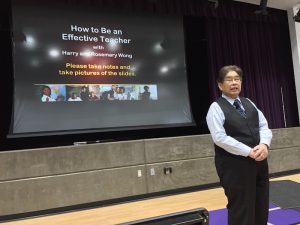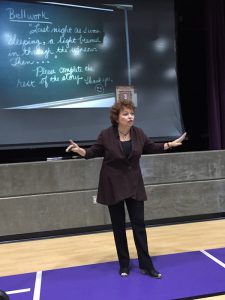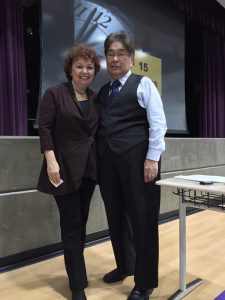Submitted by Denair Unified School District
Two of the country’s most respected experts on effective teaching brought their ideas to life Tuesday morning at a training event for nearly 100 Denair Unified teachers, principals and other staff members.
Harry Wong and his wife, Rosemary, alternately inspired and challenged their audience, infusing their talk with hands-on lessons from their own teaching careers as well as success stories from classrooms all over the country.
The Wongs are authors of many books on education, including “The First Days of School: How To Be An Effective Teacher,” with has been translated into seven languages and sold 3.9 million copies around the world. They are plenty in demand. They were in Wisconsin on Monday, flew back to California and then jumped into another plane to get to Texas for an event Wednesday.
With school beginning Thursday on Denair’s four campuses, Tuesday’s appearance was especially timely.
“Dr. Wong is the pre-eminent teacher trainer in our nation. His book … is a staple in university teacher training programs and is used by more teachers across the nation than any other resource,” said Superintendent Aaron Rosander.
Harry Wong began the session by reminding the Denair staff that “there’s only one way kids will ever learn and that’s from an effective teacher.”
“We live in Bay Area and are surrounded by technology, but technology doesn’t teach kids. There is no program that can replace a teacher,” said Wong, who was honored in 2016 with a Lifetime Achievement Award from National Teachers Hall of Fame.
The San Francisco native spent 17 years in classrooms in the Menlo/Atherton area before launching his career as a consultant. He met his wife – then a young teacher from Louisiana — while leading a seminar in Dallas in the mid-1980s. They have been married 37 years.
 Their advice to teachers young and old – devise a classroom approach that focuses on structure, maximizes learning and virtually eliminates bad behavior. They enthusiastically encouraged less experienced instructors to “steal” best practices from their veteran colleagues. Calling themselves “teacher advocates,” they said that “we teach you to plan so you can plan to teach.”
Their advice to teachers young and old – devise a classroom approach that focuses on structure, maximizes learning and virtually eliminates bad behavior. They enthusiastically encouraged less experienced instructors to “steal” best practices from their veteran colleagues. Calling themselves “teacher advocates,” they said that “we teach you to plan so you can plan to teach.”
The Wongs defined effectiveness as teaching that “produces the intended and desired results.” They encouraged teachers to greet students every day, set clear expectations and have an assignment ready as each child took their seat. They equated classroom management plans with a coach’s set of plays, the flight plan filed by a pilot or the script a wedding planner develops.
“It’s about organization and consistency,” said Harry Wong, who then recited some sobering statistics. “Every single day in America, 1.5 million kids come to class from a homeless situation, 8,000 are victims of abuse, 2,000 are afraid of being bullied. More than 1 million kids come to school from a household they’re responsible for – siblings and adults.
“Consistency in the classroom is easy. It’s predictable, reliable, dependable and stable, unlike other parts of some of their lives.”
Rosemary Wong said “a classroom management plan simply is the organization of everything you want to happen” It covers the procedures of where to sit, where to hang coats and backpacks, the day’s schedule and even what students should have at their desks. It’s the foundation of classroom structure, she said.
“We contend that the No. 1 problem in classroom isn’t discipline, but lack of procedures that establish consistency. Students are not mind-readers,” she said. “They get out of bed every day because they want to learn something in your classroom.”
 She said research from Allan Allday of the University of Kentucky shows that teachers greeting students as they arrive to class can raise engagement by 27%. She shared multiple photos of teachers from Massachusetts , North Carolina and Louisiana high-fiving and hugging students at all grade levels.
She said research from Allan Allday of the University of Kentucky shows that teachers greeting students as they arrive to class can raise engagement by 27%. She shared multiple photos of teachers from Massachusetts , North Carolina and Louisiana high-fiving and hugging students at all grade levels.
“Your warm greeting may be the only positive interaction that child has all day,” she said. “You validate their existence. That they are known.”
Rosemary Wong cautioned teachers against “wasting” even as much as 5 minutes of classroom time, saying the accumulated time over the course of six periods in a school year adds up to a month of lost instruction.
Harry Wong encouraged teachers to make student success their priority. “Tell them: I’m here for one reason only boys and girls – to help you succeed. I will teach you how to take notes, read a book, work in groups and so on.”
He encouraged teachers to think like coaches and music instructors. “They practice and rehearse over and over again. You walk around and teach during rehearsal. Finally, the kid gets it. Then you reinforce it with specific praise for their effort, not the result.”
Rosander has been trying to get on the Wongs’ schedule for three years. He considers the training sessions like the one Tuesday to be an important and essential investment in his employees’ personal and professional development. The $6,500 cost was paid for using state money set aside for training.
“We are all quite excited to have Dr. Wong in our school district,” the Denair superintendent said, holding a dog-eared copy of “First Days of Schools” that he had the Wongs autograph. On Page 88 of that same book is a picture of young science teacher standing in front of a class at a continuation high school in Hollister 30 years ago.
The teacher’s name? Aaron Rosander.

